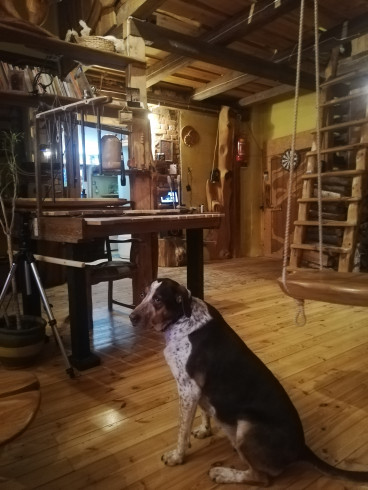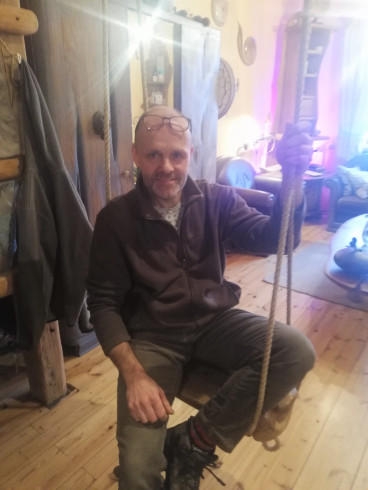Few embody this spirit more than Harijs Stradiņš. A furniture maker in Alūksne, 190 kilometres northeast of Riga, he gathers fallen wood and turns them into unique objects which reflect a soulful outlook and quirky sense of humour.
“My mother tells me, “people think you’re weird,” but I tell her, that’s fine, I don’t want to be like everyone else,” he says. “And when I go into the forest with my dog, almost every time I find peace of mind, as long as I am fully present, here and now.”
Back in 1997, Harijs was, by his own admission, “a drunkard.” He quit the vodka, and while moping around wondering what to do with his life, a friend gifted him a homemade bed with tree branches flowing from all sides. Inspired, he went to the forest and started carving a lump of wood until his hands bled, and he had found his calling.
He converted an old slaughterhouse into a combined home and workshop. In one half of the building, dust covers piles of lumber “resting and waiting” for the artisan’s attention, recently finished objects, and an eccentric array of tools, such as Soviet-era dental probes employed as chisels (given to him by his mother-in-law, a former dentist).

The other side is a cosy mancave that brings to mind the Beatles’ song “Norwegian Wood.” Warmed by a potbelly stove, Harijs lounges on a swing in the middle of the space (“for us big children,” he giggles.) There’s a large wooden glockenspiel, on which Harijs plays fine music with his two teenage sons (they live with their mother; Harijs admits he has spent too much time working and not enough on his relationships).
In the corner is a bookshelf whose structure follows the natural warp of the material, with the neck of a cello sticking out one side. And on the walls are a slew of whimsical clocks, including one with a stone in the centre turning with the hands, on one side of which is a happy face, and on the other is a sad one.
“People are so impatient to get what they want, they can’t even wait half a minute,” he explains.
After initially hawking his unusual wares at fairs, Harijs has gained a loyal following, and “Stradins Workshop” furniture has travelled around the world via the internet. But money is not his main objective. At the moment, his creative energies are producing stories and poems, and he wants to make films. If that means not relentlessly updating his social media to get new customers, so be it.
Life is too short not to follow your heart.
But his imagination hasn’t exhausted the possibilities of wood. A year ago, he came up with a unique birthday present for a family member – a spa bath filled with oak, ash and maple chips, and the pungent scent of larch around the head. The bather felt born anew, then word got around, and before long some 20 other locals had taken a dip.
Covid restrictions have put a damper on such get togethers for now. But Harijs, a devotee of German-Canadian spiritual teacher Eckhart Tolle, believes that this too shall pass. And the current crisis is largely psychological.
“Our fears have built up over many centuries, and if my grandparents and parents were scared, then I will be too, because they pass on not only their DNA, but also this form of information called fear,” he says. “But fear is just a stream of energy, and if I observe myself, it passes.”
This feature was originally published on the website of the Latvian Institute and is reproduced here with permission.
































